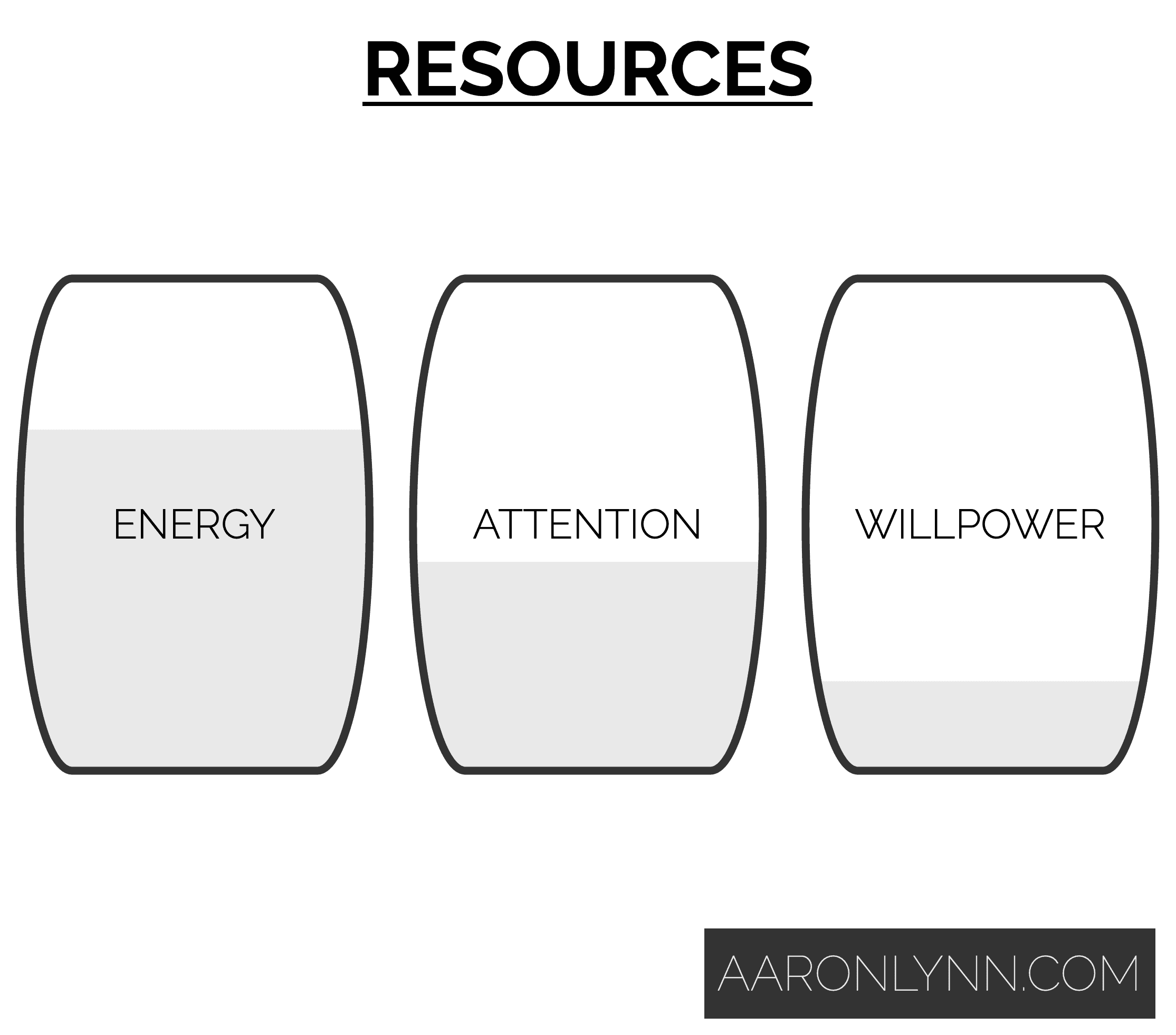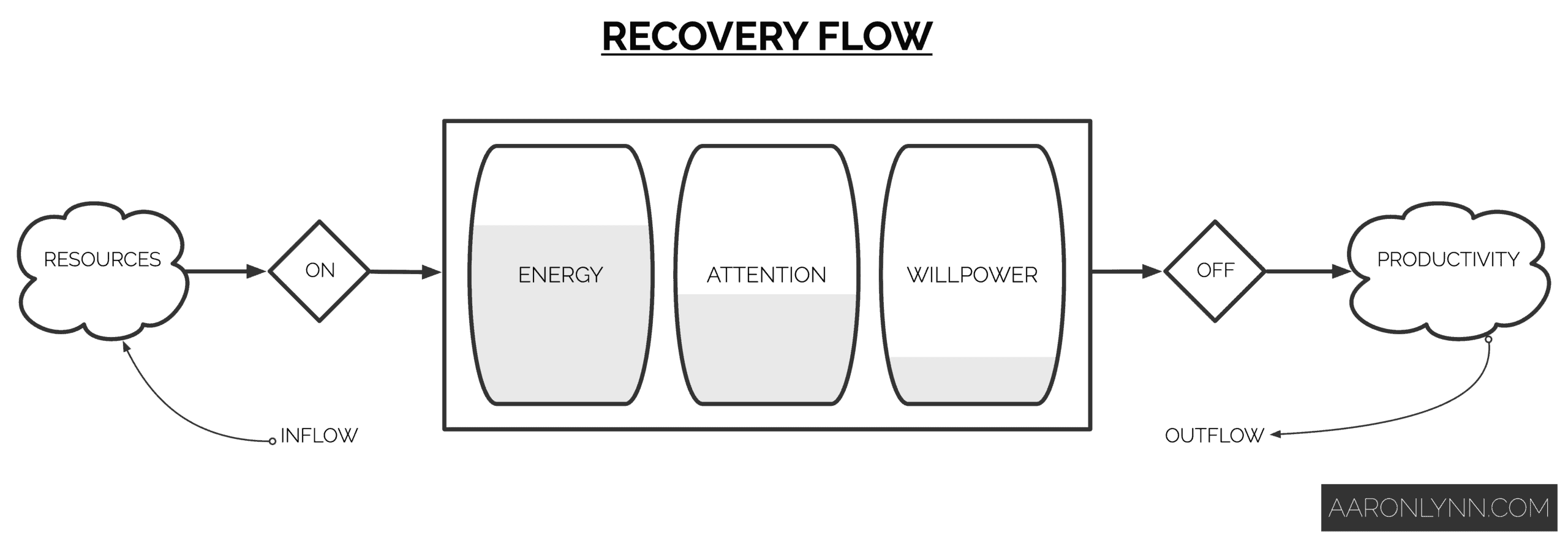
No-one is immune to burnout.
Even if you have steel-forged discipline, an iron will and the motivation to punch through any challenge… you need recovery time.
And the best way to get recovery time, is to build it into your rituals and routines — into your productivity system.
Here’s how.
What Exactly Is Recovery Time?
Recovery is the time that allows you to replenish your productivity resources — your energy, your attention and your willpower.
You naturally have recovery time in the form of sleep, which is why sleep is so important.
But beyond just sleep, many people like to “gun it” when they’re awake. This could be the busy business owner who has to juggle clients, technical work and the overhead of running their business. It could be the college student trying to keep up their GPA, do extracurricular activities and work a side-hustle.
In cases like these, sleep alone is not enough for recovery.
Why Recovery Time Is Important and Why You Need to Build It Into Your Systems
To see why recovery time is so important to your life, think of your resources as fuel tanks.
You have a limited amount of energy, attention and willpower at your disposal.
And as you go about your day, your fuel is spent and goes down.
At the end of the day, going to sleep helps you refill each of these fuel tanks.
But sometimes eight hours of sleep just isn’t enough to refill everything.
This happens when we spend fuel at a rate that is faster than a normal night of sleep can refill it. And this is through no fault of our own — modern life is easier in many ways, but it is also infinitely more taxing on our mind, body and resources.
And if we keep on expending more fuel than we intake, we burn our tanks down to zero and run on empty — which results in burnout.
What needs to be done is to temporarily turn off the outflow of fuel from our system by having recovery time.
Building Recovery Time Into Your Systems
Recovery time not only temporarily stops the outflow of fuel, but it also turns on the inflow of fuel in the same way that sleep does.
Thankfully, this is simple to do as we already have a way to plan for recovery — by using units of time.
Daily recovery time
On a daily basis, I highly recommend taking at least one hour of recovery time before bed and just relaxing.
You can watch something, read something, draw a bath or do whatever you prefer — so long as it is NOT work, and it does NOT drain any of your productivity resources.
You want to simply disconnect from your responsibilities and wind down.
Now some people will recommend “no devices before bedtime”. But that just isn’t necessary, so long as you’re using nightshift/warm screen dimming and only doing things that relax you.
This simple one hour a day is incredibly effective for people who are “always on”, like business owners. Taking the hour off will help you fall asleep faster and make your quality of sleep considerably better. This means that you will start the next day with more resources at your disposal.
Weekly recovery time
You may be reading this and are used to the idea of taking the weekend off. In that case, don’t worry — you’ve already got this one.
But for those who like to hustle and work on weekends, this is for you:
Take at least Sunday off.
The idea of one day of rest a week may be religious in origin, but it is also just good common sense. Having one day out of seven to rest and get ready for next week increases your productivity for the following week.
Here’s what happens when you don’t take Sunday off:
- You power through, and find it difficult to do so because everyone else is relaxing and resting.
- What you do this week blurs into what you do next week.
- You have no time to take a step back, reassess and prepare for what’s coming next.
If you were on a long cross-country drive, you would take a break every few hours for safety reasons to combat fatigue. Life is the same — not taking one day off a week is pushing up against your margins of safety.
Some business owners reading this may be thinking “but there’s so much to do…” and wondering how they could possibly take the time off. I know, I’ve been there. I’ve done seven days a week on the office before. But if you just take that one day off, you will be five times more effective when Monday comes around. And that means better results for yourself and your clients.
But I really want to work on Sunday
OK, for the truly obsessed, here’s what you can do.
Do “non-work” work on Sunday.
This could be:
- Household chores.
- Miscellaneous errands you need to run or get done, like grocery shopping.
- Clearing your inboxes.
- Wrapping up your journal entry for this week and planning for next week.
These things will deplete your resources less than actual work, and may even add to some of your resources.
And when they’re done, take the rest of the day off.
Quarterly recovery time
On a quarterly basis, it’s a great idea to get out of town.
Take at least 2-3 days off, preferably 3-4 days if you can manage it.
The change in your environment will help you slow down, disconnect, regroup and reassess what you need to do next.
This is of huge benefit to business people and even professionals — you’ll get a new perspective on your situation and your mind and body get to take a break.
Taking this quarterly break is one of the great secrets of preventing long-turn burnout.
Tempering Recovery and Obsession

Regular readers will know that I’m a fan of discipline, 10x and obsession.
And so it may seem a little strange that I recommend building recovery and breaks into your routine.
The reason for this is that I recommend building some in, but not excessive amounts. If you’re taking more than two days off a week or months off at a time, that’s too much.
If you “need” to go on a ski trip after every two weeks in the office because it’s “too intense”, that’s too much — and you’re not doing it right.
But what about obsession?
Well, when you’re working, you are on. Be obsessed. Go 10x. Be focused. Just get things done.
But when you’re taking recovery time or downtime, really disconnect and take a break.
That means no calls, no email, no Slack — let someone else handle it. It will all still be there when you come back, I promise.
What To Do Next
If you are a busy business owner who’s overwhelmed and wishes they had more personal time, head here to discover the 4 mistakes you’re making that are keeping you stuck in daily operations.
If you are a busy business owner who’s overwhelmed and wishes they had more personal time, head here to discover the 4 mistakes you’re making that are keeping you stuck in daily operations.
Everyone else — build downtime into your systems.
Photo by Chase Chappell.

